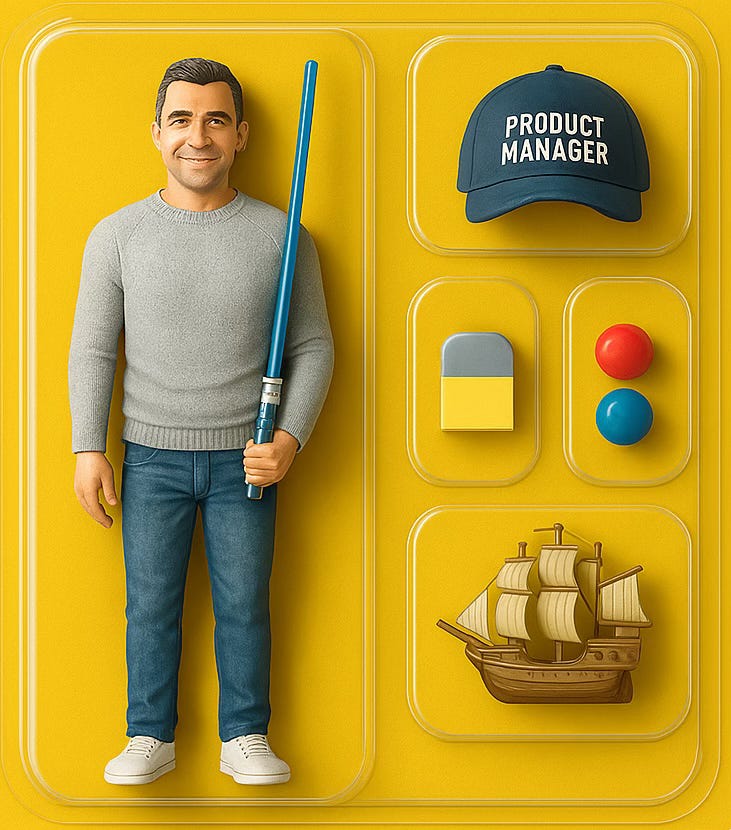The Book I Need to Write
On Product Management, Post-Agile Reality, and Finding Our Way
Some ideas refuse to stay quiet.
They keep showing up – in client conversations, late-night reflections, frustrated rants with friends over weekend drinks.
For years now, I've been carrying around a growing pile of messy thoughts about product management, organizational transformation, and why so many companies struggle with both.
It's time to write the damn book.
Why Now?
If you followed my writing (here on Substack or on LinkedIn), you know I explored and moved pieces of this puzzle before. I've written about Spanish conquistadors, product maturity, market opportunity evaluation, and ownership elephants.
At a moment I realized that those pieces feel like chapters of a larger story. A story that needs to be told in full.
The truth is: Product Management is at a crossroads.
We moved past the “Agile” revolution.
We survived the framework wars.
We "transformed" by changing words without changing anything for real.
We sat through rituals that have lost their meaning.
We have seen agile being transformed in Agile.
And through it all, we kept looking for something that works.
I wrote recently:
"You can't be unbiased. Even thinking to be unbiased is a form of bias"
Maybe it's time to stop pretending I have it all figured out. And start figuring out.
What This Book Isn't
This won't be yet another framework book promising salvation if you just follow these 7 steps.
It won't be a collection of templates that claim to solve complex human problems.
It won't pretend that product management can be reduced to a checklist.
We have enough of those books and mighty frameworks. They look good, feel reassuring, and constantly failing us in the messy reality of actual product work.
What This Book Will Be
Instead, I'll tell a story that acknowledges where we really are:
Most transformations are theatre performances where we've changed our vocabulary without changing how we think
Most frameworks became religions, with consultants as priests, selling certainty where none exists
Most companies are still project-focused while using product language
Most teams are sunk in metrics that measure motion instead of impact
The working title is "SHIFT IT: A Post-Modern Essay for the Post-Agile Era" – because that's where we are. We're living after the death of something that was once revolutionary. And rather than looking for the next revolution, maybe we need to make sense of what we still have.
The Process So Far
Well, the writing process has been... illuminating. And painful. And surprising.
I started by gathering all the ideas, frameworks, rants and observations I've collected over years of consulting and building products. What I found was that my thinking wasn't as structured as I thought it was. There were contradictions. Gaps. Places where my own biases were leading me nowhere.
This is the part most writings hide – the messiness of developing clarity. We see the polished final product, not the struggle to find sense in the noise.
But as I pushed through this process, something has started to emerge – not just another framework, but a way of seeing product work that accounts for its inherent complexity. If complexity and uncertainty is our game, let’s play it.
What's Next
Over the coming months, I'll be sharing parts of this journey. Not just the conclusions, but the struggles. The false starts. The moments when everything clicks.
If you ever felt the disconnect between what we say about product management and what we actually do... if you've sat in a "transformation" meeting and wondered if anyone else notices the emperor has no clothes... if you've grown tired of performing ceremonies while delivering nothing of value...
Then this book is being written for you. And I could use your thoughts along the way.
What patterns have you noticed in your organization? Where do you see the gap between theory and practice? What questions would you want this book to answer? What framework (oh, God, what a framework is at the end of the day?) improved something for you for real? I'm genuinely curious and might include these rare success stories in the book.
Share your thoughts in the comments. This isn't just my book, it's a conversation I want to start.
Because in the end, product management isn’t about frameworks.
It’s about creating things that matter.
And maybe it’s time we SHIFT how we think about that work.
See clearly where you want to go
Hold the horizon you can carry
Inside out, everything counts
Flow like a river, from spring to sea
Together, or not at all.


bravo!